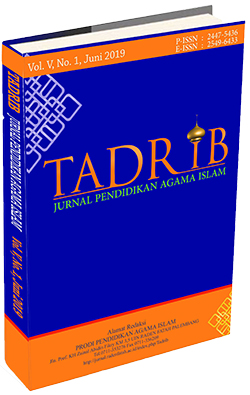Principal Leadership Based on IMTAQ in Improving Student Achievement
DOI:
https://doi.org/10.19109/tadrib.v11i2.31665Keywords:
Transformational Leadership, IMTAQ, Islamic Education, Student AchievementAbstract
This research is motivated by the urgent need for a school leadership model capable of integrating the values of Faith and Piety (IMTAQ) with student achievement improvement in the modern era, which tends to emphasize cognitive aspects. The purpose of this study is to analyze and deeply understand the principal's leadership practices in implementing an IMTAQ-based vision at Al-Khatibiyah Senior High School in Bangkalan. The research approach employs a qualitative method with an intrinsic case study design focusing on the specific context of one Islamic educational institution. Data were obtained through semi-structured interviews, participatory observation, and documentation study, and validated through source and method triangulation. The research results show that the principal implements spiritual transformational leadership through moral exemplification, participatory involvement, and the ability to inspire school members to internalize IMTAQ values. Flagship programs such as Musabaqah Hifdzil Qur'an (MHQ), religious studies, and the integration of religious values in learning have proven to contribute to improving students' academic achievement and character. The novelty of this research lies in strengthening the concept of IMTAQ-based spiritual transformational leadership that integrates religious, pedagogical, and managerial dimensions comprehensively.
References
Afriyadi, M., & Kholidiani, S. (2024). The implementation of Islamic religious education learning management in realizing religious culture. Bulletin of Science Education.
Akhyar, M., Zukdi, I., & Deliani, N. (2024). Value-based leadership of Islamic education teachers and its role in disciplinary religious practice formation: A qualitative case study in an Indonesian public school. Jurnal Pendidikan Islam. Retrieved from https://ejournal.uin-suka.ac.id/tarbiyah/JPI/article/view/8514
Atika, D., Gazali, M., Najib, K., & Abubakar, I. Y. (2025). Democratic leadership and IMTAQ: Strengthening Islamic culture at MAN 2 Muaro Jambi, Indonesia. Tunjuk Ajar: Journal of Education and Culture, 33(1), 33–41.
Bass, B. M., & Avolio, B. J. (1994). Improving organizational effectiveness through transformational leadership. Los Angeles: SAGE Publications.
Bush, T. (2003). Theories of educational leadership and management (3rd ed.). Los Angeles: SAGE Publications.
Deci, E. L., & Ryan, R. M. (2000). The “What” And “Why” Of Goal Pursuits: Human Needs And The Self-Determination Of Behavior. Psychological Inquiry, 11(4), 227–268. https://doi.org/https://doi.org/10.1207/S15327965PLI1104_01
Dewi, F. K. (2024). Principal management in building a religious school culture based on Islamic values. Indonesian Journal of Research in Islamic Studies, 1(2), 10. https://doi.org/https://doi.org/10.64420/ijris.v1i2
Emiliya, E., Zainuri, A., Gani, Y. M., & Annur, S. (2024). Implementation of the principal’s leadership strategy to improve religious culture through Friday IMTAQ activities. Fikrotuna: Jurnal Pendidikan Dan Manajemen Islam. https://doi.org/https://doi.org/10.61597/jbe
Epstein, J. L. (2011). School, family, and community partnerships: Preparing educators and improving schools (2nd ed.). Westview Press.
Fry, L. W. (2003). Toward a theory of spiritual leadership. The Leadership Quarterly, 14(6), 693–727. https://doi.org/https://doi.org/10.1016/S1048-9843(03)00054-7
Fullan, M. (2016). The New Meaning of Educational Change. International Journal of Educational Change, 9(2), 45–63.
Hallinger, P. (2003). Leading educational change: Reflections on the practice of instructional and transformational leadership. Cambridge Journal of Education, 33(3), 329–351. https://doi.org/https://doi.org/10.1080/0305764032000122005
Hamzah, N., & Ridwan, A. (2024). Integrating religious values and digital competence in Islamic education leadership. International Journal of Islamic Educational Management, 6(2), 77–90. https://doi.org/https://doi.org/10.18860/ijiem.v6i2.12564
Hoy, W. K., & Miskel, C. G. (1987). Educational administration: Theory, research, and practice. McGraw-Hill.
Kusumaputri, E. S., Muslimah, H. L., & Hayati, E. I. (2023). Study of Islamic-education leadership model: What we can learn from the dynamics of principals’ leadership in Indonesian excellence Islamic boarding-schools. Jurnal Psikologi.
Leithwood, K., Louis, K. S., Anderson, S., & Wahlstrom, K. (2004). How leadership influences student learning: Review of research. Wallace Foundation. https://doi.org/https://eric.ed.gov/?id=ED485932
Lestari, W. D., Fitriani, S., & Priyono, D. (2024). A success story of school principal’s leadership in improving school quality: A single case study at Indonesia’s integrated Islamic elementary school context. European Journal of Humanities and Educational Advancements.
Madjid, N. (1992). Islam, kemodernan, dan keindonesiaan. Paramadina.
Muslih, M., Fauyan, M., Kholis, N., & Rollie, C. D. D. (2024). Evaluating the influence of online learning on the professionalism of in-service teacher education at Islamic higher education institutions. Jurnal Pendidikan Islam, 10(2), 175–191. https://doi.org/https://doi.org/10.15575/jpi.v0i0.38463
Nurul Fitri, U., Sartika, & R. (2024). Implementasi pengembangan karier guru pendidikan agama Islam pada pembelajaran daring di era modern. ISEDU: Islamic Education Journal, 2(2), 107–116. https://doi.org/https://doi.org/10.59966/isedu.v2i2.1435
Sallis, E. (2014). Total quality management in education. London: Routledge. https://doi.org/https://doi.org/10.4324/9780203417010
Sergiovanni, T. J. (2013). Supervision and Instructional Leadership: A Developmental Approach. New York: Allyn & Bacon.
Sianipar, B. H., Nabila, A. B., Jalinus, N., & Ernawati, E. (2025). Literature review transformative, servant, and digital leadership: Shaping the future of education in Indonesia. Borneo Journal of Islamic Education, 5(1), 131–145. https://doi.org/https://doi.org/10.21093/bjie.v5i1.10760
Sugiyono, D. (2017). Metode penelitian kuantitatif, kualitatif, dan R&D. Bandung: Alfabeta.
Supriatna, D. (2025). Transformational leadership based approach to Islamic education management: Improving the quality of learning and developing student character. EDUKASIA: Jurnal Pendidikan Dan Pembelajaran, 6(1), 255–266. https://doi.org/https://doi.org/10.62775/edukasia.v6i1.1420
Supriyatno, T., & Barizi, A. (2020). Islamic elementary schools and Islamic value leadership power in Malang, Indonesia. Talent Development and Excellence, 12(1), 3413–3425.
Thomas Lickona. (1991). Educating for Character; How Our School Can Teach Respect and Responsibility (pertama; Uyu Wahyudin, ed.). Bumi Aksara.
Trimulyo, J., Lestari, H., Rahmawati, I., & Thelma, C. (2024). The influence of transformational leadership on fostering management innovation in Islamic education institutions. Al-Tanzim: Jurnal Manajemen Pendidikan Islam, 9(1). https://doi.org/https://doi.org/10.33650/al-tanzim.v9i1.10785
Wartabone, M. J. (2025). Job training on teacher productivity and its implications for strengthening students’ IMTAQ and IPTEK. Journal of Islamic Education Studies.
Zohar, D., & Marshall, I. (2004). Spiritual capital: Wealth we can live by. Bloomsbury Publishing.














